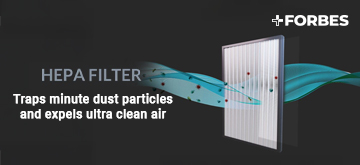
How Vacuum Cleaners Can Help Improve Indoor Air Quality: The Role of Advanced Filters
PUBLISHED ON: 25-Oct-2025
When it comes to keeping homes clean, most people often focus on visible tidiness — dust-free floors, spotless shelves, and organised spaces. Yet, what affects the well-being at home is often invisible. Tiny pollutants like dust mites, pet dander, and pollen can remain suspended in the air long after cleaning, triggering allergies and discomfort.
That’s why advanced vacuum cleaners do more than just remove dirt; they improve the air you breathe. Especially those equipped with HEPA filters, which trap the smallest airborne particles, ensuring a cleaner, healthier home environment.
How Advanced Vacuums Go Beyond Ordinary Cleaning
Even with daily cleaning, maintaining healthy indoor air can be challenging. Cleaning methods like sweeping, dusting, or using old vacuums often push fine particles back into the air instead of removing them completely. Over time, these particles settle into carpets, upholstery, and curtains, releasing pollutants back into your living space every time you walk or sit.
This is where an advanced vacuum machine makes a difference. Equipped with multi-stage and HEPA filtration, they not only capture microscopic dust but also seal it within the vacuum bin or bag, preventing re-release. The result is not just cleaner floors but also cleaner air, helping you maintain long-term indoor freshness.
Understanding the Role of HEPA Filters in Vacuum Cleaners
HEPA, or High-Efficiency Particulate Air, refers to a filtration standard designed to capture even the tiniest airborne particles with remarkable precision. These filters are made from densely packed fibres that trap contaminants through diffusion, interception, and impaction, effectively capturing dust, pollen, allergens, and microscopic microbes.
This technology ensures a substantial reduction in indoor pollutants, making it valuable for households with pets, young children, or individuals prone to allergies and asthma. When combined with strong suction power and a sealed vacuum system, HEPA filters provide a dual benefit: spotless surfaces and cleaner, healthier air throughout your home.
How Different Vacuum Cleaner Types Improve Air Quality
The right vacuum cleaner for the home can make a significant difference in maintaining both cleanliness and air quality. From daily maintenance to deep cleaning, various models offer unique advantages. Here’s a closer look at vacuum cleaners and how their advanced filtration systems help keep your home healthier.
Robotic Vacuum Cleaners: Automated Cleaning with Smart Filtration
Robotic vacuums have helped in home cleaning by making it effortless and consistent. Models like the Forbes SmartClean with Auto Bin Robotic Vacuum Cleaner not only navigate your home intelligently but also come equipped with HEPA filtration that traps fine dust and allergens during every cleaning cycle.
The auto-emptying bin feature ensures that collected dust is hygienically transferred, reducing your exposure to allergens. Combined with anti-collision and anti-fall sensors, this robotic vacuum maintains spotless floors and purer air.
Upright Vacuum Cleaners: Powerful Suction for Deep Cleaning
When it comes to deep and extensive cleaning, upright vacuums can be the preferred option. The Forbes Kordfree K10 Lite Vacuum Cleaner brings this power with the convenience of cordless operation. Its HEPA filter ensures that even the smallest particles of dust, pet dander, and pollen are captured efficiently.
The multi-surface cleaning head tackles both hard floors and carpets with ease, while the lightweight build ensures you can clean every corner without strain. Every time you vacuum, you’re clearing surfaces and making the air you breathe cleaner.
Handheld Vacuum Cleaners: Compact Yet Effective
For quick clean-ups and hard-to-reach areas, handheld vacuums are a must-have. The Sure from Forbes Compact Handheld Vacuum Cleaner combines portability with strong suction and effective dust filtration. While smaller in size, its multi-layer filtration system helps capture fine particles that would otherwise remain airborne.
Perfect for cleaning sofas, car interiors, and curtains, this device ensures that even spot cleaning contributes to better indoor air. It’s a practical choice for homes that prioritise hygiene without the bulk of larger machines.
The Long-Term Benefits of HEPA-Equipped Vacuums
Investing in a vacuum cleaner with HEPA filtration is about maintaining a healthier environment. Some of the long-term benefits include:
- Reduced allergens
- Improved respiratory comfort
- Odour control
- Less dust circulation
When used regularly, these vacuums significantly contribute to overall indoor air improvement, complementing other air purification efforts in your home.
Conclusion
Vacuum cleaners have come a long way from simply removing visible dirt. With advanced HEPA filtration technology, they now play an essential role in maintaining indoor air quality. Whether you prefer the automation of the Forbes SmartClean with Auto Bin, the power of the Forbes Kordfree K10 Lite, or the convenience of the Sure from Forbes Compact, each contributes to a cleaner, healthier home environment.
Frequently Asked Questions
Do all vacuum cleaners have HEPA filters?
No, some specific models feature HEPA filters. Always check the specifications before purchasing to ensure better air filtration.
Can HEPA vacuums help with pet allergies?
Yes. HEPA filters are useful for trapping pet dander, hair, and microscopic allergens that cause irritation.
Do robotic vacuums with HEPA filters really help air quality?
Absolutely, since they clean regularly and consistently, they reduce the amount of settled dust and allergens, indirectly improving indoor air freshness.
